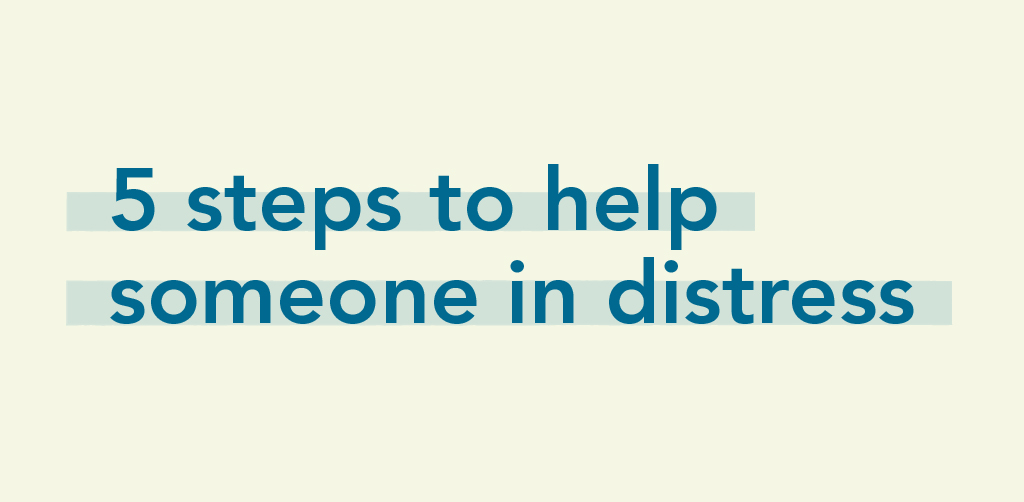The fight to end the stigma surrounding mental health and mental illness has had a major focus on the power of conversations. We agree that discussing our mental health challenges can be one of the best ways to erase the stigma and ensure that people reach out when they need help.
But even if you mean well, you might not react in the best way to a friend or family member telling you they’re having a difficult time or dealing with serious mental health challenges. If the person coming forward is also in a state of crisis, your first instinct might be to try to fix their problem, suggest a counsellor or change the subject to take their mind off their issues and “cheer them up.”
While the intentions are well-placed, these reactions can cause more harm than good, and may even encourage the person who mustered the bravery to reach out to not do so in the future.
At Distress Centre, we specialize in crisis intervention. We train our staff and volunteers extensively on the best way to respond to someone experiencing crisis and we are happy to pass that knowledge onto you.
What is a crisis?
At Distress Centre we don’t define what a crisis is. What may not be a distressing situation to one person, may strongly affect another person in a negative way. In most crisis situations, an event has happened in a person’s life that they perceive to be a problem, and their previous methods of coping are not resolving the problem, so the person looks for external support.
Though we respond to over 100,000 contacts a year, most people go to their family and friends for help before reaching out to us. When a friend comes to you in distress, here’s what you can do to help.
5. Check in on their safety.
Ask them how they are doing. Let them know that you are their friend and you are there for them. And then, if appropriate to the situation, ask them if they are having any thoughts of suicide or if they are thinking of hurting themselves. The stigma surrounding suicide is huge and it is important that you broach the subject, rather than wait for them to bring it up.
Perhaps not every serious conversation requires this, but it is better to ask, have them say no, and move on with the conversation than to leave it unsaid when they are actually struggling with suicidal thoughts. It is a myth that mentioning suicide to someone can “plant the seed in their head” and cause them to go through with it. Asking shows that you care and allows them to talk about it openly.
We are not going to delve into what to do if they are at an immediate risk of suicide in this article, but you can find information here or you can call or text us for help at 403-266-4357.
4. Listen.
Once you have ensured their immediate safety, let them know that you are open to talking. And then sit back and listen. Active listening does not mean waiting for your turn to talk. It involves:
- Acknowledging that you’re listening through verbal and non-verbal cues, like eye-contact
- Asking clarifying questions to ensure you understand what they’re saying
- Paraphrasing occasionally to confirm what they are telling you
- Showing your warmth in caring in your own individual way
- Being quiet and allowing them time to think as well as talk
Listen without judgement. Validate and normalize the feelings they are experiencing. It take a lot of courage to tell someone how you are feeling and if the person feels judged or misunderstood it might prevent them from reaching out for help in the future.
3. Recognize that there aren’t always solutions to their problems.
This is the hardest step for many. When your friend or family member is hurting all you want to do is stop the thing that’s hurting them. But a lot of the time, there is no quick fix to their problem and having someone list off solutions rather than simply listen to what they’re experiencing is frustrating. And some solutions, like immediately suggesting they talk to a counsellor can make them feel like they’re being a nuisance by trying to talk to you. The best thing you can do is listen, validate and ask them how you can best help them.
2. Help them find resources (like Distress Centre!).
Just because there are no quick fix solutions to many crisis situations, doesn’t mean the person won’t benefit from accessing resources. Calgary is home to thousands of resources for a variety of situations. That said, don’t try to force them to do anything. You may be their best resource. That’s why they came to you for support. If they do want to connect with resources but you aren’t sure which is best for their needs contact 211 for help.
1. Make sure you’re taking care of yourself too.
Helping a friend or family member through a crisis can take its toll. Make sure you have the supports in your own life to ensure your mental health doesn’t fall to the way-side. Think of your energy like a bank account. You have to put back what you spend, so take the time to practice self-care.
If you have any questions, need extra support or are struggling in any way to help your friend (or yourself) talk to us! Call or text us 24/7 at 403-266-4357 or chat with us online through our chat portal:

